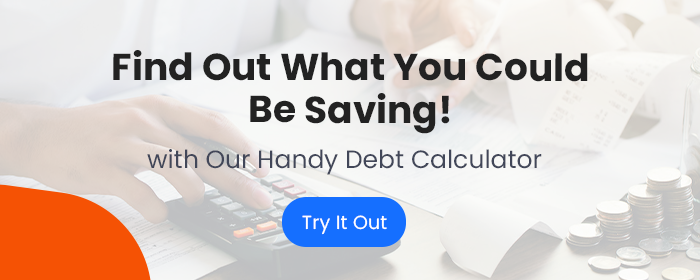
The average Canadian owes nearly $23,000 in personal debt—and that's not including mortgages! If you’re in the same boat, you may be thinking about your debt relief options. But which one is right for you?
Pros and Cons of Six Debt Relief Strategies
You might be wondering, “Do I need a debt consolidation loan or a debt consolidation program? Should I consider debt settlement? And what’s up with those snow-themed debt repayment options?” Well if you’ve got debt, we’ve got answers!

1. Paying off debt using the avalanche method
This debt repayment strategy involves paying the most money you can towards the debt with the highest interest rate first, regardless of how much money is owed, while still maintaining the minimum payments on all your other debts. Once that debt has been paid off, you move onto the debt with the next highest interest rate, and so on, while rolling in the payment you were making towards the previous debt you paid off.
- PROS: This method will likely save you money in the long-run because you’ll save in interest fees. This is a good strategy if you're more motivated by overall savings rather than the immediate gratification of watching a balance shrink fast.
- CONS: Because your focus is based on interest and not the size of the debt itself, there’s a chance you may be paying off your biggest debt first, which can take longer to pay off and achieve a win, leading to frustration and loss of motivation.
2. Paying off debt using the snowball method
This debt repayment strategy involves paying as much money as you can towards your smallest debt, regardless of the interest rate, while maintaining minimum payments on all your other debts. Once the smallest debt balance has been paid off, you roll the money you were paying towards that first debt into your payment for your next smallest debt, and so on.
- PROS: Paying off your smallest debts first provides quicker wins. In a field study of consumers using avalanche and snowball methods, the Journal of Consumer Research reveals that the snowball method is more likely to lead to success because of the instant gratification related to paying off a debt balance in full quicker.
- CONS: You could end up paying a bit more in interest in the long-run because you're paying the debts with the smallest balances first, which leaves the larger debts to get paid off later. That means those larger debts will still accrue interest—and some of those larger debt balances might have higher interest rates, too!
3. Paying off debt with a payday loan
Payday loans are short-term loans—usually no more than two weeks—meant to help you cover sudden expenses, like an urgent car repair or home repair, if you have no emergency fund. It is meant to be paid back when you receive your next paycheque.
- PROS: Payday loans are quick and easy to obtain, generally requiring nothing more than proof of age (18 or older), proof of employment (such as a pay stub), a chequing account, and a valid phone number. Some payday loans can even be acquired online.
- CONS: Payday loans are an extremely expensive way to borrow money. (Many people have been driven to the point of bankruptcy due to payday loans.) Costs are typically based on a set dollar amount per $100 borrowed, which makes it very difficult for the average consumer to determine how much interest they are actually being charged. For example, in Ontario a payday loan typically costs $15 per $100 borrowed. This might lead you to think the interest rate is only 15% when it's actually 390%! Failure to repay the loan can result in additional late fees, collection calls, being taken to court, and even wage garnishment. In addition, many borrowers have been known to fall into the dreaded payday loan cycle. This is when you take out a payday loan due to some unexpected emergency, but then in order to pay it back within two weeks, you take out another payday loan, and then another, and so on and so forth.
4. Paying off debt using a debt consolidation loan
A debt consolidation loan involves taking out a loan, usually through your bank, to pay off all your debts. Depending on the amount you’re able to acquire, you can pay off all your debts in one fell swoop. That means you'll only owe one large loan through the lending institution at a set interest rate.
- PROS: You only have one monthly payment to make, usually at a lower interest rate than you would have been charged on each individual debt. (If you can’t obtain a lower interest rate, this is not a good strategy.) The loan can be used to pay off both unsecured debt (such as credit cards) and secured debt (such as a student loan or car loan).
- CONS: Debt consolidation loans are very difficult to obtain without a good credit rating. Also, there's the risk of racking up credit card debt again after they've been paid off in full using the loan. So on top of having to pay back the huge debt consolidation loan, you will be back in debt.
5. Paying off debt through a debt consolidation program
A Debt Consolidation Program (DCP) is an arrangement where a credit counsellor at a reputable, not-for-profit agency works with your creditors to help you pay off your unsecured debt over time. Your credit counsellor will put together a proposal that outlines how much you can safely pay on a monthly basis towards your debts, based on your monthly income and expenses.
- PROS: DCPs enable you to make just one affordable monthly payment to the agency, which distributes payments to your creditors. Interest rates are greatly reduced or even eliminated, and you’ll have a set completion date to look forward to. A reputable agency also provides valuable money management advice and budgeting tools.
- CONS: Some creditors may not be willing to negotiate. In addition, only unsecured debts can be included in the program and your credit report may be negatively affected during the time you are on the program.
6. Paying off debt through a debt settlement service
Debt settlement is not like a debt consolidation loan or debt consolidation program, where you ultimately pay back your creditors what is owed to them. Debt settlement services usually offer the ability to “settle your debt for pennies on the dollar.” But it's often too good to be true.
- PROS: Seems like a great solution where you save money.
- CONS: Debt settlement services have been the focus of consumer alerts from the Financial Consumer Agency of Canada for shady practices, including large upfront fees, failure to take action, high-pressure sales tactics, complicated contracts, and false claims. Even if you do find an honest debt settlement service, your credit score will take a severe hit because you’re not paying your creditors back the full amount you owe. Plus, we’ve seen cases where clients were taken to court or sued by their creditors and lenders regardless, even though they went through a debt settlement service. The debt settlement company wasn’t able to do anything to stop the legal action, despite the client paying them.
Use our Debt Calculator to determine which debt repayment strategy is best for you
So which method is right for you? Our Debt Calculator may be able to help you figure it out, but if you’d still like to talk to a certified expert (aka credit counsellor) for free financial advice, contact us at 1.800.267.2272. We can review your options with you and answer any questions you might have. Don't be shy!

Frequently Asked Questions
Have a question? We are here to help.
What is a Debt Consolidation Program?
A Debt Consolidation Program (DCP) is an arrangement made between your creditors and a non-profit credit counselling agency. Working with a reputable, non-profit credit counselling agency means a certified Credit Counsellor will negotiate with your creditors on your behalf to drop the interest on your unsecured debts, while also rounding up all your unsecured debts into a single, lower monthly payment. In Canada’s provinces, such as Ontario, these debt payment programs lead to faster debt relief!
Can I enter a Debt Consolidation Program with bad credit?
Yes, you can sign up for a DCP even if you have bad credit. Your credit score will not impact your ability to get debt help through a DCP. Bad credit can, however, impact your ability to get a debt consolidation loan.
Do I have to give up my credit cards in a Debt Consolidation Program?
Will Debt Consolidation hurt my credit score?
Most people entering a DCP already have a low credit score. While a DCP could lower your credit score at first, in the long run, if you keep up with the program and make your monthly payments on time as agreed, your credit score will eventually improve.
Can you get out of a Debt Consolidation Program?
Anyone who signs up for a DCP must sign an agreement; however, it's completely voluntary and any time a client wants to leave the Program they can. Once a client has left the Program, they will have to deal with their creditors and collectors directly, and if their Counsellor negotiated interest relief and lower monthly payments, in most cases, these would no longer be an option for the client.







